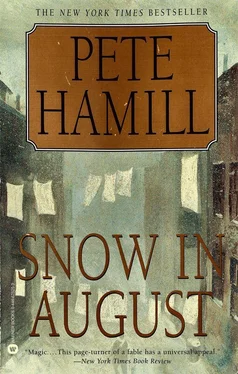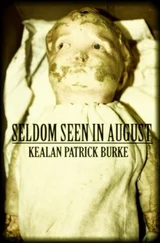Michael did more of the sweaty work of janitoring, gladly washing the halls each Saturday morning, using a cream called Noxon to polish the brass mailboxes in the vestibule, feeding coal to the hot-water boiler in the basement. This meant he missed the first stickball games of the morning, but they always kept playing as long as there was light. He remained wary and was sometimes tense, feeling that Frankie McCarthy was like a bomb ticking away. At night, he still dreamed of blood-red snow rising from watertaps and white horses on rooftops and men with hamburger for hair.
He was glad to fill the hours with other matters, and for Michael the most important matter of all was the fate of Jackie Robinson. In a strange way, he felt that he was merging with Robinson. Whenever he was alone, he imagined himself into Robinson’s mind, sharing his loneliness, feeling the way all eyes were upon him, trying to bring glory to Brooklyn while knowing that even in Brooklyn there were people who hated him. That was the lesson of the newsreel at the RKO Grandview: even people who were bound together by a place like Brooklyn and a team like the Dodgers could be split apart by things like skin color. The bitter anger of Rabbi Hirsch on Easter Sunday morning showed that religion could do the same thing. The days of spring were beautiful, but Michael sometimes thought that the world was crazy. And scary too.
When the season had started, Michael read all the stories about Robinson in the Brooklyn Eagle and the Daily News and the Journal-American . He listened to Red Barber on WHN. Days passed. And he knew that Robinson was in terrible trouble. He was drawing sellout crowds to Ebbets Field. But he was 0-for-20 against major league pitching and there were some writers who thought he might go 0-for-the-season. Michael dutifully cut out all the stories and pasted them with mucilage into a large coarse-papered scrapbook he’d bought in Germain’s department store for twenty cents; this was history while it was happening, he thought, and he wanted to keep it for the rest of his life. But each story about Robinson’s failure made him feel worse, and he wondered if he would ever fill the book. In some way he felt that if Robinson failed, he would fail too.
“Maybe the guy can’t hit up here,” Sonny said one gray afternoon, in Michael’s kitchen. “Maybe it’s like too much pressure, Michael. Maybe he’ll be like a pinch runner or something.”
“He’s gonna hit,” Michael said. “I tell you, he’s gonna hit.”
He believed this the way Mrs. Griffin believed in Madame Zadora. But the truth was that, except for a glimpse in the newsreel at the Grandview, Michael had never actually seen Robinson play. In fact, he had never even been inside Ebbets Field. With Sonny and Jimmy, he had walked around the ballpark during the last days of the 1946 season. But they never got inside; even if they’d had the money, the park was sold out. Michael believed that it didn’t really matter; after all, he had never been in the Vatican either and was still a Catholic. But going to Ebbets Field cost money. Even the cheap seats in the bleachers cost fifty cents. Anyway, he had school during the week, when the bleachers were half empty, and on weekends the whole ballpark was always sold out. He could have used the five dollars from Mrs. Griffin to guy a reserved seat, but he couldn’t just buy a ticket for himself. He’d have to buy one for Sonny and Jimmy, one for all, all for one, and three tickets would cost more than most people made in an hour. He was glad he’d given the five bucks to his mother but sometimes worried that he’d been selfish toward his friends. He wished that Mrs. Griffin would find a horse named Red Snow and win a fortune. Then they’d all go to Ebbets Field. He could even bring Rabbi Hirsch.
Meanwhile, all the Dodgers, including Robinson, were more vivid in his imagination than in life. He looked at the photographs in the newspapers, and listened to Red Barber, and imagined them into action. In his mind, he could see Robinson playing first base and Stanky at second, Reese at short and Spider Jorgensen at third. But he couldn’t really see them, in the flesh, until the school term was over. Sonny said that’s when the Police Athletic League, the PAL, started giving out free tickets. Sonny knew all about things like that. But June was a long way off. If Jackie didn’t start hitting, they could send him back to Montreal. Michael wondered if he’d ever get to see Robinson, to be there in the crowd to defend him with his voice, to make him know he wasn’t alone.
The need to be there for Robinson increased by the day. The Phillies came to Ebbets Field for three games, and they started yelling insults at Robinson. Sonny’s cousin Nunzio was an usher at Ebbets Field and told him all about it. The Phillies manager was a southerner named Ben Chapman, who had been traded away from the Yankees before the war for calling the New York fans Kikes. Now that he was a manager, he could get the whole Phillies team to yell these things at Robinson. Kike didn’t work for Robinson. He wasn’t a Jew. So they called him a nigger. They called him snowflake. They said he should go back to picking cotton. Robinson did nothing. He had promised Mr. Rickey he wouldn’t fight back. At least not that first year. And so he put up with it.
“That’s the deal he made with Rickey,” Sonny said. “He can’t do nothing about nothing, for a year. They spit on him, he can’t spit back.”
Listening to Sonny, and reading the stories, Michael tried to imagine how Robinson felt. After all, he graduated from college out in California. He was smarter than any of the idiots on the Phillies. And he had to take this crap from them? They could say things in a ballpark, in Ebbets Field , that they wouldn’t say to him out on the street? Thinking like Robinson, Michael grew enraged. He saw himself walking into the Phillies dugout with a bat in his hand and breaking heads. He saw himself sliding into second with his spikes high. If you hurt me, I’ll hurt you back.
And he thought: Jackie Robinson needs the Kabbalah.
Jackie Robinson needs the secret name of God.
Jackie Robinson needs the Golem.
Everybody else said that all the Dodgers really needed in the series with the Phillies was Leo Durocher. Leo the Lip was the Dodger manager since before the war, and he didn’t take any crap. He was a tough guy. He’d go right over to the Phillies dugout and, as Sonny said, knock Ben Chapman on his dumb fucking ass. If Robinson couldn’t do it, Durocher would, and that would be the end of that. But Durocher had been suspended before the season started by some fat southern bozo named Happy Chandler, who was the commissioner of baseball. Chandler said the reason was “conduct detrimental to baseball.” Everybody in the parish learned the word detrimental on the same day, including Michael. And everybody knew it was a bum rap.
Michael tried to explain this to Rabbi Hirsch one afternoon, as Red Barber described a game on the old Admiral.
“First, a bum rap, what is this?” the rabbi said.
“It means, well, that the guy is convicted of something he didn’t do.”
In Durocher’s case, the detrimental conduct took place in Havana. The Dodgers were playing the Yankees. Everybody in Brooklyn hated the Yankees. They wanted to beat the Giants, but they flat out hated the Yankees. Anyway, Durocher had been warned to stay away from certain people. Gamblers. Guys he knew in nightclubs or something.
“This he didn’t do?”
“No, no, he stayed away from them,” Michael said. “But at this Yankee game he noticed that two of the gamblers he was supposed to stay away from were sitting in Larry MacPhail’s box. Larry MacPhail is the president of the Yankees.”
Читать дальше












